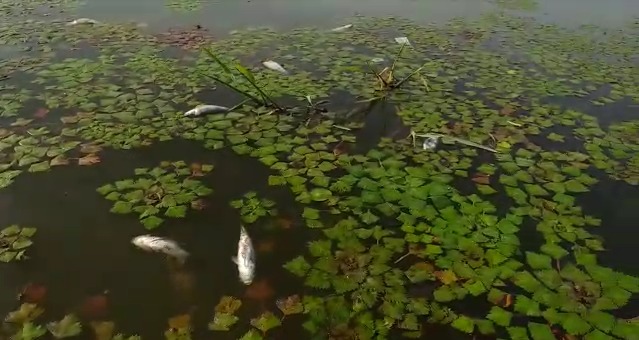The curious case of an overnight poisoning in the lake and how it threatens an entire community
On the morning on March 27, residents of the village of Mudari in Mahoba woke up to their worst nightmare – a veritable sea of dead fish floating in their village pond. Littering the surface of the pond, these fish had been painstakingly raised by the colony of fishermen in Mudari, who rely solely on fish farming for their subsistence.
“There is no life left in the lake, you can’t even hear the noise of the fish anymore,” said Shivdin, the pond committee’s chairman, echoing a strong emotion resonant of Mudari village where the soundscape of life is entrenched with the sound of gently floating fish, “We had cast a net yesterday, but we caught nothing. There are no signs that there are fish in this lake now, I think they are all dead.” As the head of the local committee, he kept track of all the fishermen involved in fish farming, as well as the quantum of fish seed they were putting into the pond. According to his estimates, 6.5 lakh fish seed had been released into the lake, “More than 4 lakh of those must have survived and have been living in the lake ever since.”
4 lakh fish dying overnight is unarguably a suspect occurrence anywhere, and in Mudari, there was a suggestion of malicious intervention. “This cannot be not natural causes,” said Shivdin, “Someone poisoned the fish by pouring in poison of some sort. It must have been diluted because otherwise, animals who rely on this lake for water would have also died.” Kheliya, another fisherman and village elder, agreed. “You can also see the condition they’re in,” he said, pointing to the lake, “This has nothing to do with the food. We’ve been feeding them the same ever since I’ve been a boy.” He speculated, “It’s definitely some strange medicine, a chemical, which was poured into the lake.”
Bharat Singh, a fisherman, also believed it was poisoning. He had a growing list of concerns, “We need to ask if our business is viable in this lake, whether it a danger to other animals, to our children, if the fish themselves are now too poisonous to eat. The stink in the lake is unbearable, and it’s becoming difficult to cross it with our boats.” He concluded, “Whoever put the poison in the water must have done it out of jealousy or contempt for us.”
Fish production is a growing business, one that has consistently gotten the centre’s support, the most recent form of which has been the Rs. 3000 crore Blue Revolution program piloted by the Department of Animal Husbandry, Dairying and Fisheries. The Department, even before the Blue Revolution was instated, has been leasing out ponds, lakes and reservoirs, especially in rural India, to encourage fish farming – which includes growing fish seed and caring for them until they mature, and then catch them. Known as aquaculture or freshwater fish farming, it is often an alternative income source for fishermen. In U.P., all 375 ponds under the purview of the state fisheries department are currently being leased. “Our committee is named in the contract which is valid for ten years,” said Shivdin, “We pay an annual fee of Rs. 2500 as determined by the gram sabha.”
Like in most of the state, aquaculture often makes up a majority of the income of local communities. According to Shivdin, they had only just released the fish seed. “We have sold nothing,” he said about the possibility of recovering losses from caught fish sales. To make matters worse, he explained, “They are all dead, and this is no season for breeding. We will find no fish seed right now. It will now just stay empty.” What should have been a profitable, sustainable model of business has left 15 families, by Shivdin’s estimates, without a source of income and without a contingency plan. “Our seed should be valued by the government. Why else would we have taken responsibility for this lake?” Shivdin said, frustrated. But after a moment of looking at the lake again, the stench of death inescapably in the air, he said quietly, “How will I provide for my family now with this lake? I am so sad looking at this lake.”
Poisoning is one of the most common problems faced by fish farmers in rural U.P. The villagers, all suspecting foul play, reached out to the Kulpahad Tehsildar S. M. Sharma to conduct an investigation into the matter. Our reporter spoke with Kulpahad’s Kutval Bijender Singh who promised that, now that the matter had been brought to their attention, swift action would be taken. Depending on their findings, he said, further action will be taken.
This Khabar Lahariya article first appeared on Firstpost.


